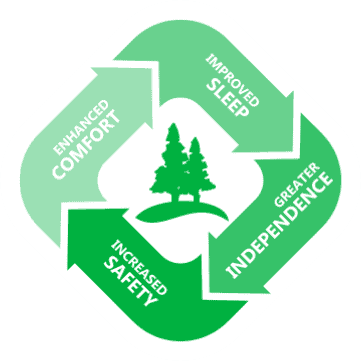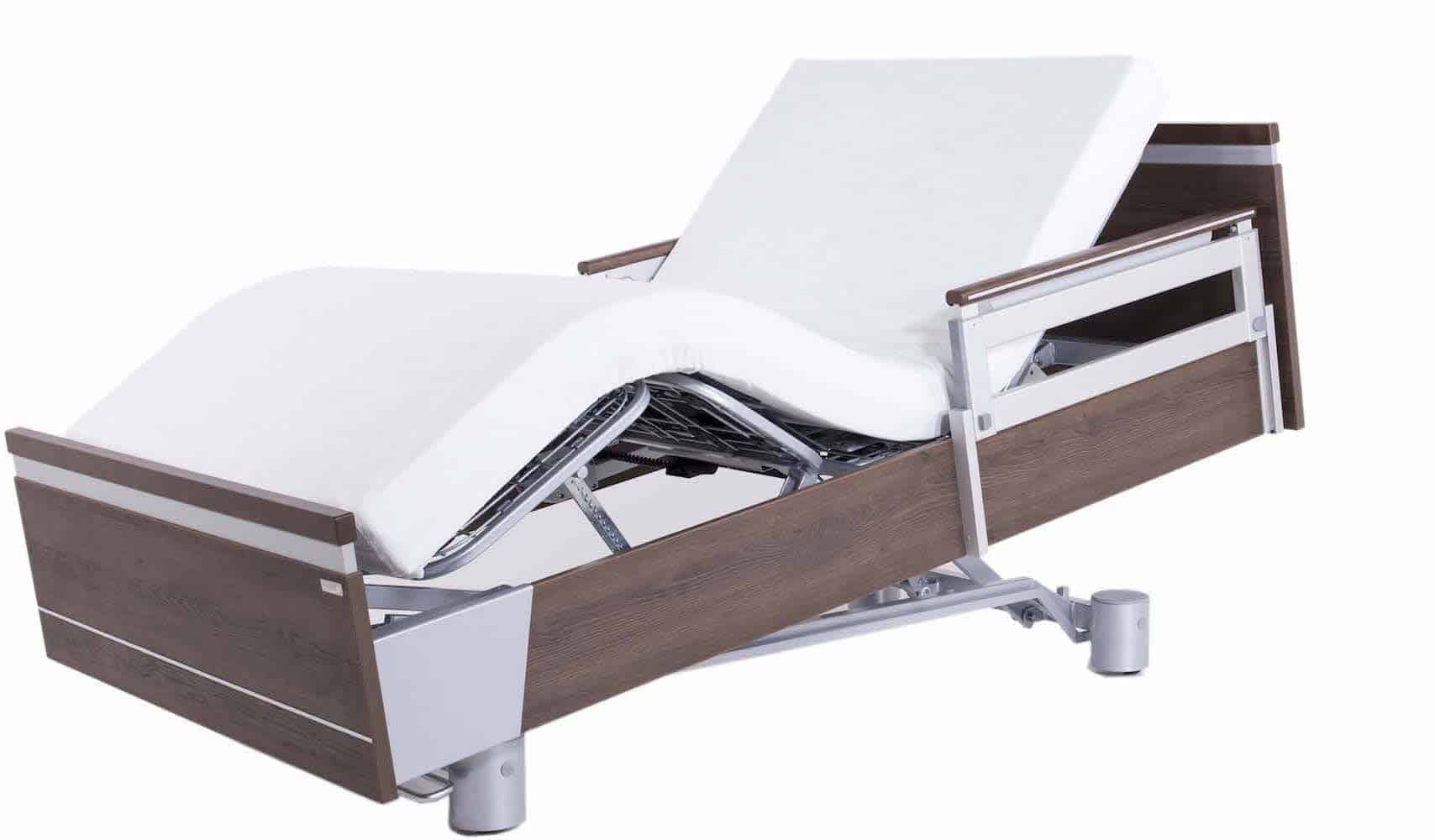Learn About How A Hospital Bed Improves Comfort and Independence for those with ALS (Lou Gherig's Disease)
| Key Takeaways |
|---|
| ✅ Amyotrophic lateral sclerosis (ALS) is a disease of the nervous system that affects the nerve cells in the brain and spinal cord, leading to a loss of muscle control. |
| ✅ Many ALS patients find a hospital bed beneficial through all stages of the condition. It allows the user to raise and lower their head and feet and adjust the height of the mattress. |
| ✅ Hospital beds can help prevent bedsores for those with ALS. Assist rails and pressure-relief mattresses are necessary for those who develop mobility issues as ALS progresses. |
| ✅ SonderCare provides hospital beds with all the necessary features without the sterile look of a medical bed, making patients with ALS feel more comfortable. |
| ✅ ALS affects as many as 30,000 people in the United States, with an estimated 5,000 new cases every year. The right care bed can help manage the illness and ensure patients don’t become isolated. |
How ALS Affects The Body
ALS affects both kinds of neurons that make up the central nervous system: upper motor neurons and lower motor neurons. They are necessary for the muscles to function, and a patient’s symptoms will manifest based on how each type of motor neuron is affected:
- Upper motor neurons begin in the cerebral cortex and extend into the spine. They send messages from the brain to the lower motor neurons.
- Lower motor neurons are found in the brain stem and through the spine. They take messages from the upper motor neurons and send them to the muscles and glands throughout the body.
When these motor neurons start to decline, they lose their ability to send vital signals to the muscles. Upper motor neuron disorders generally cause muscle stiffening, whereas lower motor neuron diseases lead to a loss of muscle tone.
ALS symptoms will often begin as muscle twitches and cramps, progressing into a weakness of the arms and legs and difficulties speaking and swallowing. As it progresses, the patient will be increasingly unable to move parts of their body affected by the upper and lower motor neurons. The condition can make those affected by ALS become dependent on assistive devices such as a feeding tube in the latter stages.
Patients with ALS have lengthy and costly hospital admissions. Hospitalization in amyotrophic lateral sclerosis. N. Lechtzin, C. Wiener, L. Clawson, V. Chaudhry, G. Diette. https://doi.org/10.1212/WNL.56.6.753. Neurology
Hospital Beds Can Help With Mobility For Patients With ALS
Many ALS patients, family members, and caregivers find a hospital bed beneficial through all stages of the condition. It allows the user to raise and lower their head and feet and adjust the height of the mattress. If the patient has trouble sitting up or moving on their own, a hospital bed with a remote and programmable settings can be helpful. It allows for better positioning for improved circulation, and medical workers can provide care and transfer the patient with less strain.
In the early stages of ALS, raising the bed height helps the user stand up to get out of bed; the user can adjust the head and feet with an attached hand controller. On SonderCare luxury models, the patient can also take advantage of pre-set positions, such as Chair, Auto Contour, and Mobility Assistance. When the condition progresses to requiring a wheelchair, raising or lowering the bed with high-low elevation can help when transferring to and from the bed.
Comprehensive palliative strategies may ease suffering and allow the patient to die with dignity in the home. Expanding the role of hospice care in amyotrophic lateral sclerosis. G. Carter, Lisa M. Bednar-Butler, R. Abresch, Viviane O. Ugalde. https://doi.org/10.1177/104990919901600607. The American journal of hospice & palliative care
Hospital Beds Can Help Prevent Bedsores For Those With ALS
Hospital beds have the right features and accessories for those who need help following their diagnosis. Assist rails are necessary for those who develop mobility issues as ALS progresses. These bed rails can also give patients the stability to turn themselves in bed, which can help them prevent bedsores and shearing when a caregiver isn’t present. They also provide stability when getting in and out of bed. Combined with a pressure-relief mattress, ALS patients and their caregivers will find that hospital beds work best to manage and prevent bed sores and shearing.
SonderCare has worked hard to give those with medical conditions like ALS a bed with all the necessary features without the sterile look of a medical bed. Many believe hospital beds are uncomfortable and refuse to use them regardless of how their disease has progressed. It’s difficult for patients and families to resist the idea that a hospital bed is only for sick people. With high-quality upholstery and clean designs, our beds will make anyone diagnosed with ALS feel more comfortable coming home.
ALS affects as many as 30,000 people in the United States, and estimates suggest there are 5,000 new cases every year. The diagnosis can be overwhelming for patients and their families, and daily tasks can be challenging. The proper care bed can help the person manage the illness and ensure they don’t become isolated. With comfort, support, and style, SonderCare luxury hospital beds can alleviate many of the stresses related to ALS and help patients stay comfortable for longer.
- Severity of a spinal cord injury dictates the type of bed needed to improve the patient's quality of life.
- A comprehensive rehabilitation team provides care once the patient is home, involving various specialists.
- Initial rehabilitation focuses on muscle function, fine motor skills, and daily task adaptation, often requiring a suitable bed.
- Hospital beds with adjustable features aid in rehabilitation and enhance patients' independence.
From Our Experience... "In my time visiting nursing homes and assisted living facilities, I've seen the transformation that occurs when an ALS patient is provided with a hospital bed at home. The comfort and convenience it offers is unparalleled. These beds are designed to provide optimal support for the body, reducing pressure points and helping to alleviate pain. They can be adjusted to various positions, which can aid in breathing, circulation, and digestion - all of which can be challenging for ALS patients."
Kyle Sobko Hospital Bed Expert
- Amyotrophic lateral sclerosis (ALS) is a progressive disease affecting the nervous system, leading to a loss of muscle control.
- ALS affects both upper and lower motor neurons, which are crucial for muscle function. As these neurons decline, they lose their ability to send vital signals to the muscles, leading to muscle stiffening and loss of muscle tone.
- Symptoms of ALS often begin as muscle twitches and cramps, progressing into weakness of the arms and legs and difficulties speaking and swallowing. As it progresses, patients become increasingly dependent on assistive devices.
- Hospital beds can be beneficial for ALS patients, allowing them to adjust their head and feet positions, and the height of the mattress. This can help with mobility, improved circulation, and ease of care.
- Hospital beds can also help prevent bedsores for ALS patients. Features like assist rails provide stability and help patients turn themselves in bed, preventing bedsores and shearing.
- SonderCare provides hospital beds with necessary features for ALS patients, designed to avoid the sterile look of a typical medical bed. This makes patients feel more comfortable at home.
- ALS affects up to 30,000 people in the United States, with an estimated 5,000 new cases each year. The right care bed can help manage the illness and ensure patients don’t become isolated.
Frequently Asked Questions About ALS (Lou Gherig's) and Hospital Beds
Adjustable positioning in a hospital bed allows individuals with ALS to change positions easily for comfort, assistance with breathing, eating, and other daily activities. This can also help alleviate symptoms such as muscle cramps and stiffness.
By offering the ability to frequently adjust positions, hospital beds can help redistribute pressure and decrease the risk of pressure sores. Some beds are also compatible with specialized mattresses designed for pressure relief.
By offering the ability to frequently adjust positions, hospital beds can help redistribute pressure and decrease the risk of pressure sores. Some beds are also compatible with specialized mattresses designed for pressure relief.
Hospital beds can be raised or lowered, aiding in safe patient transfers and minimizing physical strain on caregivers. Side rails can provide additional support during transfers and repositioning.
Some hospital beds are designed with attachments for medical devices such as ventilators, feeding tubes, or trapeze bars. This can make it easier to manage various care needs of ALS patients at home.
The choice of bed depends on the specific needs and progression of the disease in an individual patient. Electric hospital beds offer ease of use and numerous positioning options, which can be particularly beneficial for ALS patients.
As ALS progresses, mobility can become increasingly difficult. A home hospital bed can provide comfort, safety, and facilitate care-giving tasks. It also allows for home care, which many patients prefer.














